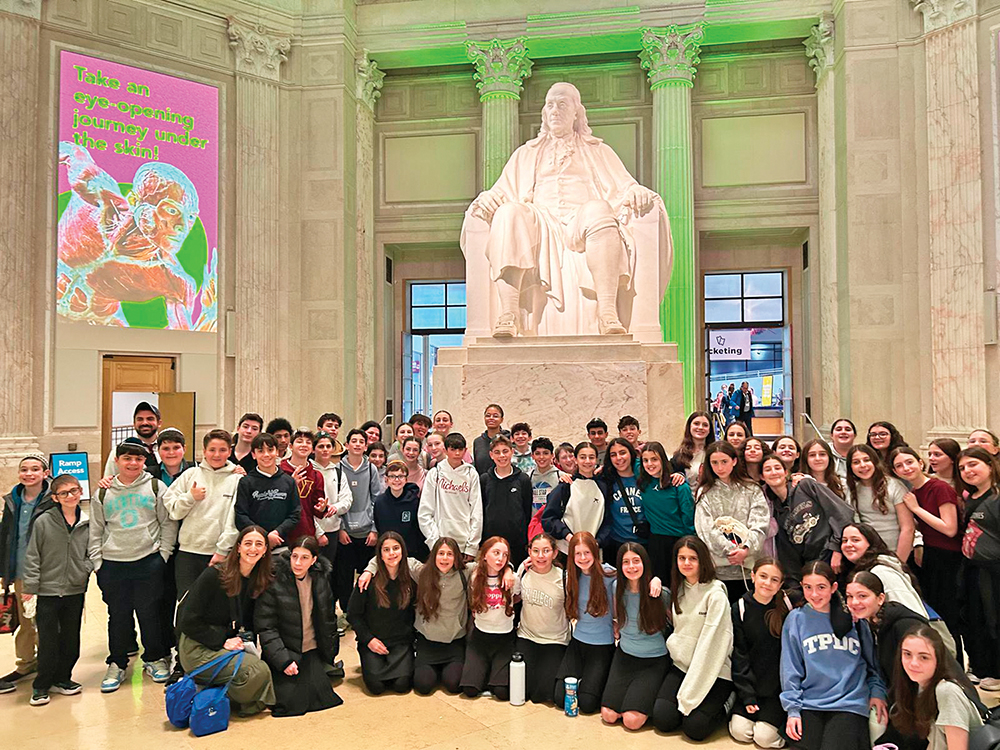Though the Seder night focuses on Yetziat Mitzrayim, we also mention antisemitic episodes that preceded and followed the events in Egypt.
The very first Jews experienced antisemitism. The people of Aram attacked Avraham for his religious beliefs, and Chevron’s landowners resisted selling him land. What explains this long-lasting, pervasive hatred?
For Our Success
Yitzchak was also hated—because of his success. After their jealousy caused the Pelishtim to stuff Yitzchak’s wells, their king, Avimelech, expelled Yitzchak from Gerar: “Leave us, because you are stronger than we are,” (Bereishit 26:16).
Pharaoh used this same “strength” to convince the Egyptians to enslave and persecute the Jews. “And he said to his people: ‘The Jewish people are greater and stronger than we are. Let’s act wisely with them, lest they become many and join our enemies in the event of a war … ’” (Shemot 1:9-10).
Our continued success has caused us to be hated many times since then. Professor Thomas Sowell—the famed African-American academic and leading scholar of economics and the history of prejudice—was once asked what Jews could do to minimize the hatred and hostility towards them. “The answer,” said Sowell, “is one word: ‘Fail.’”
He continued that Jews are the most successful minority in history. Because of this remarkable success, they have been the most hated. Given equal opportunities, we have been proactive and resourceful in succeeding more than others. What do others do when this happens? Sowell continues, “They can either hate themselves for underperforming or hate others for overperforming—it is easier to do the latter.”
Those looking to find the source of antisemitism often miss the massively disproportionate representation of Jews, in almost every index of human achievement. Instead of learning and benefitting from the great success of a contributing minority, many choose a path of envy and jealousy, which leads to hatred.
For No Reason
Yaakov was also hated—by both his brother and his father-in-law. Though the Torah describes only Eisav’s hatred and intention to kill Yaakov explicitly, the Haggadah mentions only Lavan’s evil intentions: “Tzei u’lemad: mah bikeish Lavan HaArami laasot l’Yaakov Avinu … ”
The Maharal (Gevurot Hashem 54) explains that the Haggadah focuses on Lavan’s hatred as opposed to Eisav’s because Lavan had no reason to hate Yaakov. Eisav hated Yaakov because he had taken his bechora and brachot. Lavan, though, had no excuse. Though Yaakov was his son-in-law, married to his daughters and the father of his grandchildren, Lavan still hated him and sought to destroy him.
Hated for Every Reason
Lavan’s hatred of and attempt to eradicate Yaakov and his family is a precedent for similar attempts throughout the ages. We have been hated wherever we have lived—even by those who have had no reason to hate us.
Amazingly, Jews have been hated for every imaginable reason—and its opposite. Professor Michael Curtis points out that:
“The uniqueness of antisemitism lies in the fact that no other people in the world have ever been charged simultaneously: With alienation from society and with cosmopolitanism. With being capitalistic exploiters and also revolutionary communist advocators. The Jews were accused of having an imperious mentality, and at the same time, they were the people of the book. They’re accused of being militant aggressors, at the same time as being cowardly pacifists.
With being a chosen people and also having an inferior human nature. With both arrogance and timidity. With both extreme individualism and community adherence. With being guilty of the crucifixion of Jesus and at the same time held to account for the invention of Christianity …
Everything and its opposite becomes a reason for antisemitism,” (“Antisemitism in the Contemporary World,” chapter 1).
The Real Reason
The fact that there are so many reasons—even those that contradict one another—indicates that none of these reasons is the real one.
Yechezkel HaNavi (20:32-34) explains that Hashem uses antisemitism to stem our assimilation. When Jews see themselves as part of broader society, Hashem causes that society to remind us that we do not belong. We are the nation that dwells alone because we have a special relationship with Hashem and a unique mission in His world (Bamidbar 23:9).
The Abarbanel saw Yechezkel’s prophecy as relevant to his generation as well (Abarbanel to Yechezkel 20). Jews flourished in the Iberian Peninsula for centuries. They felt part of the Spanish and Portuguese societies and their Golden Age. Then suddenly, they were persecuted—and eventually banished. Based on Yechezkel’s prophecy, the Abarbanel explained that the persecution was meant to remind Jews that they were different—not part of Spanish and Portuguese societies.
Anne Frank responded similarly to Nazi oppression. “The persecution reminds us that we are not like the rest of the nations of the world—we have a higher purpose… We can never become just Netherlanders, or just English or representatives of any country for that matter. We will always remain Jews,” (Anne Frank, Diary of a Young Girl, entry dated April 11,1944).
Yirmiyahu HaNavi begins Megillat Eicha by wondering why the Jewish people are so isolated, and why no one consoles us when we suffer (Eicha 1:1, 19). He answers that Hashem keeps others from sympathizing so that we are forced to return to Him (ibid. 1:8, 18). Knowing that only Hashem cares for us forces us to turn to Him.
‘Bechol Dor Vador’
We summarize this historical process at a critical turning point on the Seder night. After the initial description of the servitude in and exodus from Mitzrayim (what the mishna calls, “Matchil begenut u’mesayeim beshevach”), we take a step back and speak about the hatred of Lavan that predated our arrival in Mitzrayim. Before doing so, we transition by singing “Vehi Sheamda”—a piece that highlights the attempts by the nations of the world to destroy us in every generation.
Before and after describing these attempts, Vehi Sheamda credits Hashem with saving us from these consistent threats. As we have seen, Hashem causes our enemies to threaten us in order to distance ourselves from them, and He saves us to bring us closer to Him.
Our Seder This Year
After October 7th, this year’s Seder night and the recitation of Vehi Sheamda should feel especially relevant. Like many generations of Jews, we too, have been viciously targeted by a vile terrorist group and hated and demonized by its supporters around the world.
Let’s remember what the true cause of our suffering has always been and continues to be. May this realization merit us Hashem’s salvation—“bayamim haheim bazman hazeh.”
Rav Reuven Taragin is the dean of overseas students at Yeshivat Hakotel and the educational director of World Mizrachi. His new book, “Essentials of Judaism,” can be purchased at rabbireuventaragin.com













